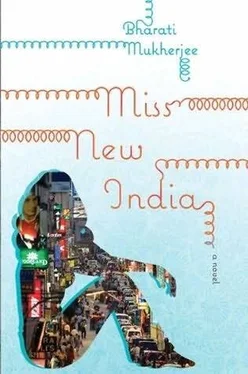In Gauripur, she'd slept between Sonali-di and Ma, and after Sonali-di's wedding, just with Ma. In Bangalore, the dark, musty mansion was empty most nights, but for Mad Minnie and arthritic Asoke, because the resident girls were at work; sleeping here, surrounded by noises coming from the untended, overgrown grounds, terrified Anjali. Ghosts and monsters circled her. An angry Baba and a tearful Ma clawed the thin cotton quilt she pulled over her head. She needed time to overcome her fears.
Gauripur memories collided with Bagehot House nightmares. Smothering memories: the same neighborhood noises at the same time, day and night. Chopping the same vegetables from the same vendor at the same market, spicing them and frying them in precisely the same manner, eating at the same hour after her father's nightly three pegs, then piling the dirty cooking pots in the sink for the part-time maid to clean the next morning, putting away the leftovers, and going to bed by ten o'clock at her father's command of "Lights out!" You could run away from home, but not from the rituals of family.
Some sleepless nights she looked down through the shutters at the grounds, now a jungle, but once the setting for croquet hoops and badminton nets. In modern Bangalore terms, it embraced just one city block, a few crores of value, but somehow it engaged the whole soul of India. Anjali heard the nighttime coughing and throat clearing of rural India inside the Bagehot compound. She saw cooking fires in the second floor of the broken-roofed garage that had stored Maxie's fancy cars; the building's windows were long gone. Old Asoke, recognizable because of his white livery jacket, flitted ghostlike in and out of patchy moonlight, carrying trays of food to the shadowy villagers who inhabited this dilapidated realm. Perhaps Minnie's retinue-their children and grandchildren-had never left, though they now bore no connection or obligation to the owner of the main house. More likely, they were invaders from the countryside; like her, they were both refugees and squatters. Staring down at that night world of Indian survival, of rural life in the middle of a thriving city, Anjali asked herself, What makes me more special? Why would Usha Desai accept me as a trainee and help place me in some American company that pays salaries as fat as Tookies and Husseina's?
A girl of fifteen or so, backlit by a cooking fire, straddled the ledge of a window frame, combing out her hair. Oh, Rabi, Angie thought, if you were here now, you'd make a picture of this. Every minute in Bagehot House, day or night, is a portrait in contrasts, lights and angles, old and new, and this strange, indescribable present moment in history. I could be your scout. You might have gone to all those terrible places, the whorehouses and gay haunts, but I can find you scenes you haven't dreamed of! I could carry your cameras and lenses and lights. I'm smart, I notice things, I can learn.
For a week Anjali put off calling Usha Desai. Bagehot House had only one phone, an old-fashioned, heavy black instrument with a short frayed cord. Minnie kept it, together with a bound logbook for recording all incoming and outgoing calls and a wind-up clock, on a card table in the foyer. The rules and rates for its use by boarders were listed in red ink on a piece of cardboard taped to the wall above the table. Only Minnie and Asoke were permitted to pick up the receiver when the phone rang. Boarders were charged for receiving calls as well as for making them; they paid an additional surcharge for calls that lasted more than five minutes. Since Tookie, Husseina, and even Sunita had their cell phones, Anjali was the only one affected by Minnie's rules. She thought the rates unfairly steep. Fortunately, except for Usha Desai and Mr. GG, she knew no one to call in Bangalore, and she invented new excuses hourly for delaying that career-building call.
On the eighth day into her new life, worried that Peter would get wind of her procrastination and write her off as a bad investment, she steeled herself to dial the number for Usha Desai. To use the phone free, which meant without Minnie's and Asoke's knowledge, she had to loiter in the foyer until Minnie retired to her bedroom for her midafternoon nap and Asoke slipped off to the "village" on the Bagehot compound. After two rings a taped message came on, informing callers that they had reached the Contemporary Communications Institute, the location of the institute, and the instruction to leave name, phone number, and a brief message after the beep. Anjali had never spoken to a tape. By the time she started to say her name, the dial tone came on, and she hung up, flustered. Such a bumpkin!
She would be prepared for the answering machine the next time she dialed the Contemporary Communications Institute. She knew she should mention Peter's name with her first breath-that would set her call apart from other supplicants-but should she refer to him as Mr. Champion or as Peter, and should she mimic a regional American accent ("Five dallars!") to show off her aptitude?
At lunch the next day, with Tookie pub-hopping with friends and Sunita away at her job, Anjali took advantage of being alone with Husseina, Queen of Cool. She asked, "If you closed your eyes and heard me for the first time, would you guess I'm Indian?"
Without a second's hesitation, Husseina answered, "Of course. How else could you sound?"
Was Husseina assuring her that an Indian accent wasn't necessarily a demerit for a future call-center agent? Anjali decided Husseina intended her remark as a pat on the head, a well-grounded opinion that a non-desi English accent was seriously overrated. She pursued the point: "How did you come to sound so American?"
Husseina stripped forkfuls of mashed potato off the top of the wedge of shepherd's pie on her plate. "If you really want to know," she said finally, "I had no choice. My parents sent me to the American School in Dubai."
What was the point in Anjali's even trying to compete with the rich, cosmopolitan Husseinas of Bangalore? She didn't stand a chance of getting a job here. Why had she bothered to run away from Gauripur, and run away so melodramatically at that? It was unfair that the Husseinas led charmed lives. Her hands curled in rage around her napkin ring. All of those call-center workers at Barista, who had so dazzled her during her first hour in Bangalore-were they also graduates of expensive foreign schools, getting reacquainted with their parents' homeland?
Asoke shuffled around the dining table, removing plates and the cruet stand. Husseina gulped down a full glass of water. "If I'd had a say in the matter, I'd never have left India." It seemed a startling confession, coming from Her Serene Highness, the never-ruffled Husseina Shiraz. "The American School was a very great mistake. My parents were clueless! Not that anything can be corrected now." Her words were bitter but delivered lightly, and with a smile. "Spilled milk, water under the bridge, sleeping dogs, et cetera, et cetera."
Anjali was dying to ask Husseina about growing up in glamorous Dubai and, if she dared, what Husseina meant by "mistake." She waited until Asoke finished serving dessert, which as always, except on Sundays, was a gelatinous blob that Minnie called blancmange. "I wish we could talk some more."
"We shall," Husseina said.
"I have a favor to ask." Anjali ignored Husseina's frown. "I have a contact in town, a lady who runs a job-training academy of some sort. If I phoned her, do you think she would reject… is my accent, you know…"
"Miss Husseina, Miss Anjali, Nescafé?" Asoke interrupted them. Minnie charged extra for after-dessert instant coffee. Asoke removed the matching sugar bowl and creamer and their coffee spoons without waiting for them to answer. "Sweet course finished, miss?" He clearly meant to hurry them out of the dining room so that he could lock up the dining-kitchen-pantry area and disappear into the village of squatters for the rest of the early afternoon.
Читать дальше












